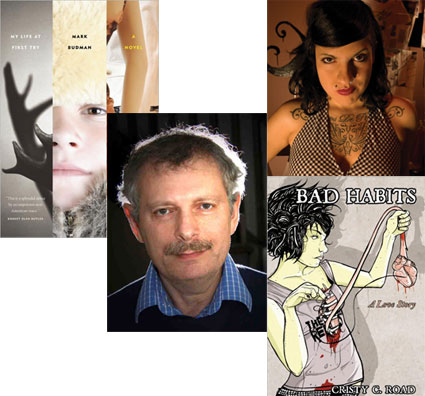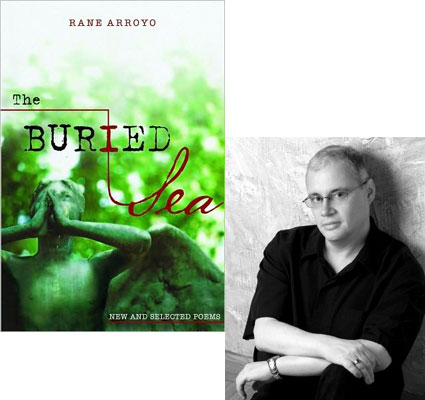Beatrice @ The Merc: Mark Budman & Cristy C. Road

I’m proud to announce a new batch of events for “Beatrice @ The Merc,” a reading series dedicated to debut novelists that I curate for the Mercantile Library Center for Fiction. On Wednesday, January 14, my guests will be Mark Budman (My Life at First Try) and Cristy C. Road (Bad Habits); the reading will take place at the Mercantile’s midtown Manhattan headquarters (17 E 47th St.) at 7 p.m. Books will be available for purchase after the readings, and we’ll also have wine and cheese.
Mark Budman‘s works have appeared or are about to appear in such magazines as Weird Tales, Mississippi Review, Virginia Quarterly, The London Magazine, Iowa Review, McSweeney’s, Turnrow, Connecticut Review and the anthology Flash Fiction Forward. He is the publisher of the flash fiction magazine Vestal Review. He is the co-editor of the anthology You Have Time for This, published in 2007 by Ooligan Press; a yet untitled anthology is forthcoming in 2009 from Persea Books.
Cristy C. Road has been illustrating ideas, people, and places, ever since she learned how to hold a crayon. She graduated in 2004 with a bachelor’s of Fine Arts in Illustration, whether or not the administration at herschool irritated her. Roughly two years after that, her repertoire consists of ten years of independent publishing, two graphic novels, and countless illustrations for a broad slew of magazines, record album art, concert posters, and political organizations.
And, while I’ve got your attention, mark January 28 and February 11 on your calendar—I’m still pinning down a few last details, but the authors I do have lined up already are great, and you’re going to want to be there!
6 January 2009 | events |
Rane Arroyo, “Book Signings”

A handsome man buys my book, asks me to read
his poetry sequence about Pablo Casals that’s in
a suitcase in a bus station nest. It’s a time when
anyone can be an enemy combatant because
of bad luck—ah, no. I sign my name over and
over again, as if I’m in a killer bee spelling bee.
Why do these hieroglyphics matter to strangers?
I have yet to heal my mirror, much less theirs.One reader is a chiseled Christian, a library in
tight jeans. Another is Zoracaster just flirting at
a taco stand; he’s a new poem waiting a poet.
My exhaustion feels like jet lag without the journey.
I carry a leather notebook—in case of? A poem or
any motorcycle rides out of the mysteries of my myself.
I’m mistaken for Robert Downey, Jr.—in a mug shot?
I sign my books, stop owning them, and mourn later.I sign, but think of Sandburg’s tall Chicago, Hughes’ Harlem
of shiny shoes, Arenas’ vanishing Cuba, Ritsos’ Greece of
erotic ghosts, Hemingway’s pubic Paris, Dos Passos’ scared
USA, Armchair’s unedited Jerusalem, our O’Hara’s NY of
“sun-like” Puertorriqueños, Paz’s silent Tiajuna, Gasoline’s Rome
of stigmata feasts, Auden’s horsed Iceland, Isherwood’s Berlin
in a bad blonde wig, Haney’s mud-fed paradise, Calvino’s
floating Italy and Arroyo’s—will any place actually be mine?
From The Buried Sea: New and Selected Poems, a collection of Rane Arroyo‘s poems going back to 1985. Other poems by Arroyo available online include “Always” (at the Poetry Foundation’s website), “Tequila Country” (at Agni), and “The Wandering” (Strange Horizons). He also had several poems included in the summer 2003 issue of Poetry.
“Instead of muses, I have a coterie of ghosts,” Arroyo told an interviewer about an earlier collection, The Portable Famine, in which “Book Signings” first appeared. “Some have appeared in other books (Uncle Rachel, my drag queen uncle, for example) and others startled me with their new presences (Mormon friends from my Utah years). Betsy Sandlin just recently wrote a scholarly paper on my being a ‘haunted’ poet, even though she hadn’t yet read The Portable Famine. But my ‘invisible guests,’ as CzesÅ‚aw MiÅ‚osz writes in a poem, do not frighten me or arrive with messages or even tasks to complete to help them. My poems may help keep these ghosts from a final, even more profound death: They must not be forgotten.”
5 January 2009 | poetry |

 Our Endless and Proper Work is my new book with Belt Publishing about starting (and sticking to) a productive writing practice.
Our Endless and Proper Work is my new book with Belt Publishing about starting (and sticking to) a productive writing practice. 
